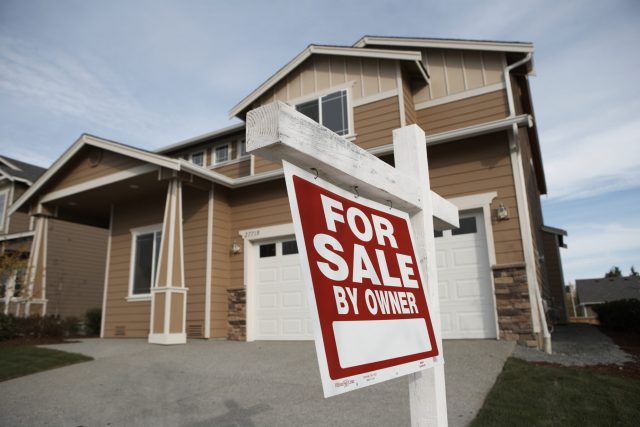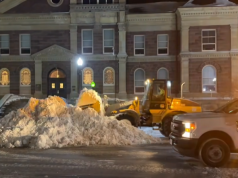
By:Nick Evans
Ohio state Rep. Gary Click is joining the chorus of Ohio officials floating ideas to rein in property taxes.
The Vickery Republican recently introduced a “trilogy” of property tax reforms restricting what levies are available, potentially requiring more of them to go to the voters and imposing higher thresholds to pass more expensive levies.
“I know that our constituents are demanding a response, and this is me saying, ‘I’m listening,’” Click said.
His ideas join several others up for debate. A handful of proposals would cap the growth in property taxes — either to a specific percentage, the rate of inflation or based on a homeowner’s wealth. Others would expand the homestead exemption.
After vetoing several property tax measures in the state budget, Gov. Mike DeWine put together a new working group to come up with suggestions as well. The group continues to meet and is tasked with sharing their ideas at the end of the month.

Click’s trio
The first bill Click filed, House Bill 420, would eliminate continuing levies. In short, every property tax proposal on the ballot after 2030 would need to have an end date.
“We’re not saying that these are bad levies that are out there,” Click said. “But it’s saying, okay, each generation should have a voice in saying ‘I understand what I’m paying this tax for, I agree, or I disagree.’ I think that’s too much, or not enough, or whatever it is, but that each generation gets to have their voice heard.”

Continuing levies filed prior to that cutoff would expire unless they were approved to pay for bonds. Any taxes that did expire as a result of the bill would be eligible for renewal, but taxing authorities would have to take the proposal to the ballot.
Click’s second measure allows local organizers to reduce what’s known as “inside millage.” The Ohio Constitution allows local authorities to levy up to 10 mills (or 1%) in property taxes without going to the voters. Anything beyond that amount requires voter approval. House Bill 421 would allow petitioners to go to the ballot to lower that 10-mill ceiling further.
Organizers would need to gather signatures from 15% of the area’s voters in the most recent gubernatorial election to get the question on the ballot. The bill also requires two-thirds approval from local taxing authorities to put the question of restoring the 10-mill ceiling on the ballot.
“What works in Sandusky County might not work in Seneca County; what works in Seneca County might not work in Crawford County or Marion County,” Click argued. “And so each county gets to assess and look at the situation, and what works for their community, rather than imposing a statewide assessment on property.”
His last proposal, House Bill 422, would require supermajority support for proposals with higher millage rates. Levies of less than one mill (or 0.1%) could pass with a simple majority, but those of one mill to 1.9 mills would need at least 60% approval and those of two mills or more would have to clear 66%.
“The more you want, the more you ask for, the higher the bar is going to be,” Click said.
His second and third proposals, however, could test the boundaries within the state constitution. The Ohio Constitution sets the terms, barring local authorities from taxing property “in excess of one per cent of its true value” unless those levies are “approved by at least a majority of the electors.”
Whether courts would interpret that section as guaranteeing 10 mills of unvoted property tax or a simple majority standard for additional levies is an open question. So far, Click said, he hasn’t heard any warning about constitutional conflicts.
Working group check in
The governor’s working group continues to wrestle with recommendations for lawmakers. At its most recent hearing, the group debated a pair of delay tactics.
First, the working group considered offering some kind of deferral for homeowners hit with eye-popping property tax bills. But even that simple idea raises a host of other questions. Should it be one-time or renewable? Should the state charge interest? What about minimum requirements — do homeowners need a certain amount of equity or ownership history?
The group largely settled on capping deferrals at a dollar amount whether they run once or consecutively. It also nixed the idea of charging interest, while leaving the door open for charging an administrative fee. In terms of minimum requirements, a home equity benchmark was popular, but Warren County Auditor Matt Nolan explained it would be difficult to assess.
“You know, I can pull your mortgage to see what you took a mortgage out for,” he said, “but I can’t see how much you’ve paid down on that or not, and are there other outstanding liens that aren’t recorded?”
Instead, the group landed on a 10-year home ownership minimum as a decent proxy. The members also seemed open to making ownership transferrable, so seniors who downsize don’t wind up resetting the clock.
But not everyone was on board with deferrals. Lake County Auditor Chris Galloway likened pushing off payment amounts to kicking the can down the road.
“It doesn’t change what somebody’s tax liability is,” Galloway said. “All we’re doing is changing the taking — collecting those taxes from grandma or her corpse, right?”
Instead, Galloway suggested lawmakers pause property tax increases temporarily while they come up with a comprehensive response.
“The idea behind it is to, like, hit the pause button somehow,” he said. “To stop the outrage, to stop the bleeding, to be able to say, let’s give ourselves some time to fix this problem right.”
Auditors would still go forward with assessing properties and updating valuations, but tax bills would hold steady. That delay might give lawmakers time to pass legislation like House Bill 186 — an idea popular with working group members that would limit tax increases to the rate of inflation.
But other working group members, particularly Chair Bill Seitz, seemed skeptical of the idea. Those paused tax increases would eventually come due, and in the meantime, the benefits would land unevenly. For instance, Galloway acknowledged taxpayers who saw spikes after last year’s reassessments, including those in his county, wouldn’t get any immediate relief.









